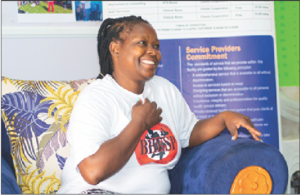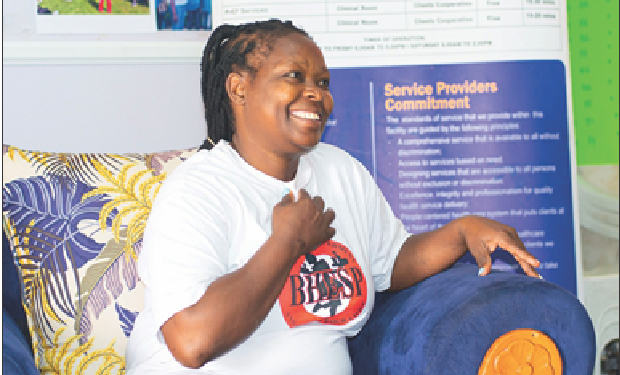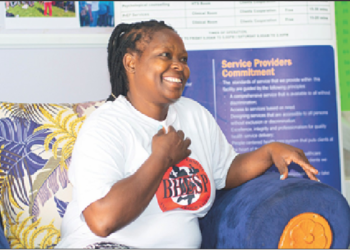Mary Mugure, 38, lives in Nairobi’s Dandora estate, a low-income residential area in the east side of the capital. She is has six children and two grandchildren. All her kids have different fathers, and all were conceived from her work as a sex worker.
She started out as a stripper in a Nairobi club at the age of 18. But ultimately she ended up in sex work. “Stripping was just a cover up of my sex work but with time I gained confidence and I had to fully concentrate on it and eventually I stopped stripping”, she told The Lancet HIV.
Although there was more money in sex work than in stripping, the risks were also bigger. “I was once forced to have unprotected sex with a client for no pay by a pimp. The man used me the whole night and never paid me”, she said. “Worse was that he left without paying for the room. I was detained for some hours before my friend came to pay the room for me.”
Mary faced a substantial chance of contracting HIV especially from clients who insisted on not using any protection during sex. She was lucky not to have acquired HIV. In 2016,
she was introduced to pre-exposure prophylaxis (PrEP) by a Bar Hostess Empowerment and Support Program (BHESP) peer educator. She had been waiting for a client in a bar one evening when the peer educator struck up a conversation with her about PrEP. “I got interested because I had heard about the drug (PrEP) from a friend but I was shy to ask how I could get it”, she said. “So I agreed to enrol into a pilot study they were doing on PrEP”, Mary explained about how she bought into the idea from the peer educator. “I have since then used PrEP without fail.”
Before PrEP she charged between
$5–15. Now Mary does not take anything less than $30. “PrEP has also given me the confidence and so I have had to raise my work standards since a client doesn’t have to use a condom while having sex with me.”
PrEP can almost eliminate the risk of HIV infection if taken as prescribed. However, because it does not protect against pregnancy or other sexually transmitted infections (STIs), is is used with other risk reduction methods, such as condoms and not sharing injection equipment.

Mary Mugure first heard of PrEP from a friend then joined a pilot study
Mary’s two eldest daughters, aged 20 and 19 years, are also on PrEP. “They are using PrEP but I don’t know if it is just for their own protection or they are also doing sex work”, she said. “All my children know that I am a sex worker, and they respect me for that because as a single mother, I have managed to pay for their house rent, buy them food, and still educate them.”
Mary hopes to switch from oral PrEP to use of the dapivirine ring. “I have heard that it works way better than the oral PrEP.” Although evidence does not necessarily prove the ring is more effective, it might be a more appropriate choice for some women.
PrEP brought Mary to face the reality of her life as she had to take an HIV test before enrolling for it. “Before PrEP I had never tested for my HIV status. I was even scared when they told me that I had to take the test before enrolling for PrEP. I was more than relieved that the results turned negative. I now test for HIV every month before my drug refill.”
Alice Washeke, age 35 years, shares common bonds with Mary. She is a sex worker on PrEP and so is her
19 year old daughter, Nikita Wanjiku. Alice also stays in Dandora. Alice is a PrEP champion at BHESP and her daughter Nikita is a PrEP champion at Determined, Resilient, Empowered, AIDS-free, Mentored and Safe women (DREAMS).
BHESP, supported and funded by USAID is working with sex workers in the low income settlement areas in Nairobi. It is a sex-worker-led organisation whose mission is to influence policy and to facilitate an enabling environment for the provision of HIV services, championing human rights awareness and economic empowerment for sex workers, gender minority women, and adolescent girls and young women in Kenya.
Under BHESP, peer educators are selected and trained in empower- ment and support including HIV/AIDS prevention, care and risk management and vulnerability. Alice chose to use PrEP because she cannot do her work without drinking and so sometimes she forgets to use a condom, which is a risk to her life. “I have used oral PrEP for more than 3 years now”, said Alice, although adding that initially it was on and off, she became more consistent 2 years ago after losing her friend, who was also a sex worker, to HIV.
“My friend introduced me to PrEP, but she didn’t keep up using it. You know with our work all you care about is making money. No one cares about protection. So if you get a client offering you $100 if you agree to serve him [have sex] without a condom, you have no option but to agree”, said Alice. “So, risk pushed me to use PrEP and it has worked well since then.”
Some people have side-effects of PrEP, including headaches and nausea, but Alice says she has never had any problems. “The only challenge I have is that the drugs are big and are packaged in a bottle that is very visible. So if I get a client who wants to travel with me for some days, I have to wrap the drugs in a tissue then hide them in my hand- bag. No one will agree that they are prevention drugs. All they think about is that the drugs are antiretroviral therapy and so you have HIV”, she explained.
“I was once slapped by a client who believed my PrEP drugs are antiretroviral therapy. He didn’t want to listen to any of my explanations. He left but after a long fight. He however warned me that if he tested HIV positive, he would come for life. I couldn’t report because sex work is not legal in Kenya and you will have to bribe the police to help you. I was so terrified for my life.” Nikita, Alice’s daughter was exposed to HIV at the age of 17 years. “I slept with a man without protection”, Nikita told The Lancet HIV. “As I was walking out of the lodging where I had slept with him, one of the workers there called me and warned me that the man is rumoured to be HIV positive…I had no option but to tell my mum.” Alice rushed her daughter to the DREAMS offices where Nikita was given post-exposure prophylaxis (PEP). “That’s how my mum started talking to me about PrEP and how she is using it”, Nikita said.
“I get my PrEP under the DREAMS programme and because I consistently go for my refill every month, they asked me to be their PrEP champion in Dandora. I use PrEP too because most of the boys I sleep with are not faithful”, Nikita said. “However I also use my contraceptives so that I don’t get pregnant.”
As a PrEP champion, Nikita talks to young people (aged 18–24 years) about HIV and the use of PrEP as a prevention measure. “It is hard to convince young people to take PrEP, but some agree to it”, she said.
Pauline Emmaculate, a BHESP service provider in Dandora, explains that when the sex workers come for PrEP for the first time, they are taken through all the available HIV services at BHESP and then given an option to choose what they want.
“The majority of the sex workers range from the ages of 30 to 50 years”, said Emmaculate. Once they decide that they want to enrol for PrEP, they are counselled then tested for HIV, a process that takes about 1 hour. The challenge, Emmaculate says, is that many sex workers do not feel like they have time to go through the procedure. Some end up leaving without taking the PrEP.
“Also most of them are never ready to take a HIV test. They assume for them to get PrEP it is unnecessary to be tested”, Emmaculate said. “Counselling is important because they understand more about HIV and decide what they want.”
Nelius Ruiru, a programme officer at LVCT Health, says that because oral PrEP was officially launched in 2017 in Kenya, it is available in all health facilities. “PrEP is highly effective, given for free, safe in pregnancy”, Ruiru told The Lancet HIV. “However most sex workers say they cannot get PrEP from public health facilities because they have to come with their partners.”
The other challenges of PrEP, she said, include low retention of women and adherence to daily use of the drug. Most women self-discontinue complaining about the pill burden and inadequate information on PrEP among their sex partners, who assume it might be antiretroviral therapy. According the 2022 UNAIDS global update, access to oral PrEP remains concentrated mainly in several high- income countries and five countries in sub-Saharan Africa: Kenya, Nigeria, South Africa, Uganda, and Zambia. PrEP support groups based at drop- in centres in Nairobi, Kenya, helped improve PrEP adherence and retention among female sex workers from 22% to 60% after 12 months.
UNAIDS report notes that as new prevention tools become available, such as long-acting injectable PrEP, focused efforts will be needed to roll them out as swiftly and effectively as possible, “Boosting awareness and knowledge among potential users, including through social media, is vital because PrEP needs to be normalised as an effective HIV prevention option”, said Ruiru, adding that there is a growing transition to dapivirine rings that are inserted in the vagina. The ring is self- inserted but it is recommended that a health practitioner inserts it the first time around.
LVCT she said is carrying a study to inform the Kenyan government on the PrEP ring. Some of the side- effects being noted include urinary tract infection, pelvic pain, and vaginal discharge. The 3-year-long study is ongoing in Kisumu, Mombasa, and Nairobi since July 2023 with support from the MOSAIC grant.














